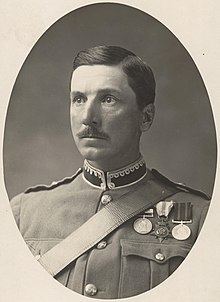Cyril Cameron
Cyril Cameron | |
|---|---|
 | |
| Senator for Tasmania | |
| In office 29 March 1901 – 31 December 1903 | |
| In office 1 January 1907 – 30 June 1913 | |
| Personal details | |
| Born | 5 December 1857 Nile, Tasmania |
| Died | 22 December 1941 (aged 84) Nile, Tasmania, Australia |
| Nationality | Australian |
| Political party | Protectionist (1901–03) Anti-Socialist (1906–09) Liberal (1909–13) |
| Relations | Norman Cameron (brother) |
| Occupation | Soldier, pastoralist |
Cyril St Clair Cameron, CB (5 December 1857 – 22 December 1941) was an Australian soldier and politician. He was a Senator for Tasmania from 1901 to 1903 from and from 1907 to 1913.
Early life
[edit]Cameron was born on 5 December 1857 at Fordon, his family's grazing property near Nile, Tasmania.[1] He was one of four children born to Mary (née Morrison) and Donald Cameron. His paternal grandfather, also Donald Cameron, was a Scottish naval surgeon who had settled in Van Diemen's Land in 1822 and established Fordon the following year.[2]
Cameron's father was elected to the Tasmanian Legislative Council in 1868 and his older brother Norman Cameron later served alongside him in federal parliament. He was educated at Launceston Church Grammar School and also spent time in Edinburgh.[1]
Military service
[edit]Cameron served in Afghanistan 1878–1880 and South Africa during the Boer War 1899–1900, rising to position of Colonel in the AIF.[3] He was later aide-de-camp to the Governor-General and warden of Evandale. He was made a Companion of the Order of the Bath in 1901 for his service with the Tasmanian Mounted Infantry during the Boer War.
Politics
[edit]In 1901 he was elected to the Australian Senate as a Protectionist Senator for Tasmania. (His brother, Norman Cameron, was elected to the House of Representatives at the same election as a Free Trader.) He was defeated in 1903 but was re-elected as an Anti-Socialist in 1906.[4]
In 1912, Cameron was denied Senate preselection by the Tasmanian Liberal League for his refusal to sign a pledge agreeing not to stand against the successful candidates if not chosen. He recontested his Senate seat at the 1913 federal election,[4] self-identifying as an "Independent Liberal".[5] He polled only around two percent of the statewide vote, with his term expiring on 30 June 1913.[4]
Personal life
[edit]In 1887, Cameron married Margaret Honeywood Hughes, a daughter of General Sir William Templer Hughes of the British Indian Army. The couple had five children together,[4] including Lt. Colonel Donald Cameron (1888–1979) who was awarded the MC and OBE.[6] He was predeceased by two of his sons: Cyril, who died at the Battle of Neuve Chapelle in 1915, and Ewan who died in 1941.[4]
Cameron retired to "Fordon", also spending time at his mansion "Lowestoft" near Berriedale. He died on 22 December 1941, aged 84.[4]
References
[edit]- ^ a b Cameron, Caroline (1979). "Cameron, Cyril St Clair (1857–1941)". Australian Dictionary of Biography. Vol. 7. Canberra: National Centre of Biography, Australian National University. ISBN 978-0-522-84459-7. ISSN 1833-7538. OCLC 70677943.
- ^ Cameron, Donald (1969). "Donald Cameron (1814–1890)". Australian Dictionary of Biography. Vol. 3.
- ^ "Cyril St Clair Cameron". www.clan-cameron.org.au. Archived from the original on 10 April 2012. Retrieved 25 February 2018.
- ^ a b c d e f Bennett, Scott (2000). "CAMERON, Cyril St Clair (1857–1941)". The Biographical Dictionary of the Australian Senate. Retrieved 29 November 2022.
- ^ "Federal Elections: Senator Cameron at Franklin". Huon Times. 9 April 1913.
- ^ "Lt. Colonel Donald Cameron, OBE, MC". www.clan-cameron.org.au. Archived from the original on 6 July 2011. Retrieved 25 February 2018.
- 1857 births
- 1941 deaths
- Protectionist Party members of the Parliament of Australia
- Free Trade Party members of the Parliament of Australia
- Commonwealth Liberal Party members of the Parliament of Australia
- Members of the Australian Senate for Tasmania
- Members of the Australian Senate
- Alumni of the University of Edinburgh
- Independent members of the Parliament of Australia
- Australian Companions of the Order of the Bath
- British military personnel of the Second Anglo-Afghan War
- Australian military personnel of the Second Boer War
- Australian military personnel of World War I
- Australian independent politician stubs
- Free Trade Party politician stubs
